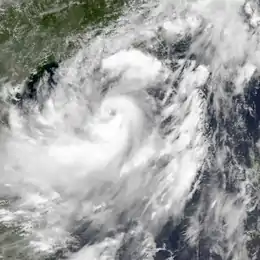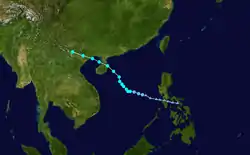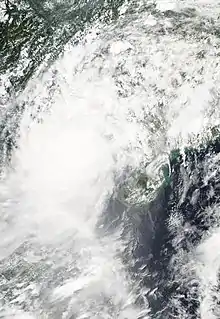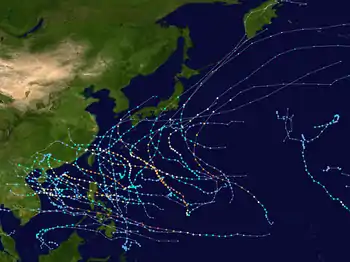Tropical Storm Jebi (2013)
Severe Tropical Storm Jebi (pronounced [tɕe̞.bi]), known in the Philippines as Tropical Storm Jolina, caused loss of life and moderate damage across Vietnam and South China in July 2013. At least six people were killed in Vietnam. The most extensive losses took place in Quảng Ninh Province where 320 homes and 200 hectares of crops were damaged.[2] In China, losses were listed at CNY490 million (US$80.3 million).[3]
| Severe tropical storm (JMA scale) | |
|---|---|
| Tropical storm (SSHWS) | |
 Severe Tropical Storm Jebi near peak intensity on August 2 | |
| Formed | July 28, 2013 |
| Dissipated | August 3, 2013 |
| Highest winds | 10-minute sustained: 95 km/h (60 mph) 1-minute sustained: 110 km/h (70 mph) |
| Lowest pressure | 985 hPa (mbar); 29.09 inHg |
| Fatalities | 7 total |
| Damage | $83.2 million (2013 USD) |
| Areas affected | |
| Part of the 2013 Pacific typhoon season | |
Meteorological history

On July 26, a low pressure area was observed 600 km (375 mi) east of General Santos City and was embedded along the intertropical convergence zone that brought heavy rains to Mindanao.[4] During the next three days, the low pressure area crossed the Philippines and arrived on the West Philippine Sea on July 30, located west of Batangas.[5]
After favorable conditions, both PAGASA and JMA upgraded the system into a tropical depression and was named Jolina. On July 31, the JMA upgraded the system into a tropical storm and was given the international name Jebi.[6] On August 1, Jebi continued to intensify, and reached severe tropical storm on August 2.
On August 3, Jebi weakened into tropical storm, and the JMA and JTWC downgraded Jebi into tropical depression and made landfall over Northern Vietnam, before it dissipated later that day.
Impact
Philippines

In Cotabato City, incessant rains caused by the low-pressure area in Mindanao submerged 25 of its 37 villages. The floods forced the city government to suspend classes for elementary both public and private schools. Heavy rains also flooded areas around the Liguasan marshland, including 14 low-lying towns in Maguindanao and seven towns in North Cotabato.[7]
China
Tropical Storm Jebi made separate landfalls in China and Vietnam on the 2nd and 3rd. In China, Jebi brought periods of heavy rain and near hurricane-strength wind gusts across Hainan Island. Approximately 1,000 homes were damaged and economic losses were listed at CNY490 million (US$79.9 million).[8]
Vietnam
Jebi made landfall in Quang Ninh on August 3 morning at 03.00 UTC. In Vietnam, more than 1,000 homes and other structures were damaged in multiple northern provinces. At least seven people were killed and 11 others were injured. Total economic losses were estimated at approximately VND75.89 billion (US$3.3 million).[9][10]
Located at the edge of the storm, Hanoi has had little rain last night. To 10 rain to cover the entire province (concentration about 30 minutes). The moment happened flooding rain in some locations, such as: Pham Van Dong (areas without sewer system), down 5 Phung Hung - Duong Thanh, Doi, Lieu Giai, Huynh Thuc Khang, Nguyen Promotion receded ... and after 15 minutes.[11]
References
- Weather Warning, "Tropical Storm “JEBI”" No. 3 Time Issued July 31, 2013
- "Storm Jebi claims six lives". Vietnam Net Bridge. August 4, 2013. Retrieved October 1, 2013.
- "Member Report (2013)" (PDF). typhooncommittee. p. 53. Retrieved December 8, 2013.
- "LPA Being Monitored Near General Santos". Philippine Inquirer. July 26, 2013. Retrieved October 1, 2013.
- "Exiting LPA to Continue to Bring Rains in PH". Philippine Inquirer. July 30, 2013. Retrieved October 1, 2013.
- "Tropical Storm Jolina Intensifies into Storm". GMA News. July 31, 2013. Retrieved October 1, 2013.
- "30000 Affected by Floods in Cotabato City, Maguindanao, North Cotabato, Sultan Kudarat". InterAksyon. July 27, 2013. Archived from the original on October 2, 2013. Retrieved October 1, 2013.
- China Meteorological Administration (November 22, 2013). Member Report: China (PDF). ESCAP/WMO Typhoon Committee: 8th Integrated Workshop/2nd TRCG Forum. ESCAP/WMO Typhoon Committee. p. 16. Archived (PDF) from the original on December 2, 2013. Retrieved November 26, 2013.
- August 2013 Global Catastrophe Recap p.7. Retrieved on November 16, 2013.
- http://phongchongthientai.mard.gov.vn/FileUpload/2019-08/iY6RhUKimkC2WAcp2013-Tong%20hop%202013-CT.pdf
- Bão đổ bộ Quảng Ninh VnExpress (In Vietnamese)_Retrieved on December 17, 2013
External links
| Wikimedia Commons has media related to Severe Tropical Storm Jebi (2013). |
- JMA General Information of Severe Tropical Storm Jebi (1309) from Digital Typhoon
- JMA Best Track Data of Severe Tropical Storm Jebi (1309) (in Japanese)
- JTWC Best Track Data of Tropical Storm 09W (Jebi)
- 09W.JEBI from the U.S. Naval Research Laboratory
